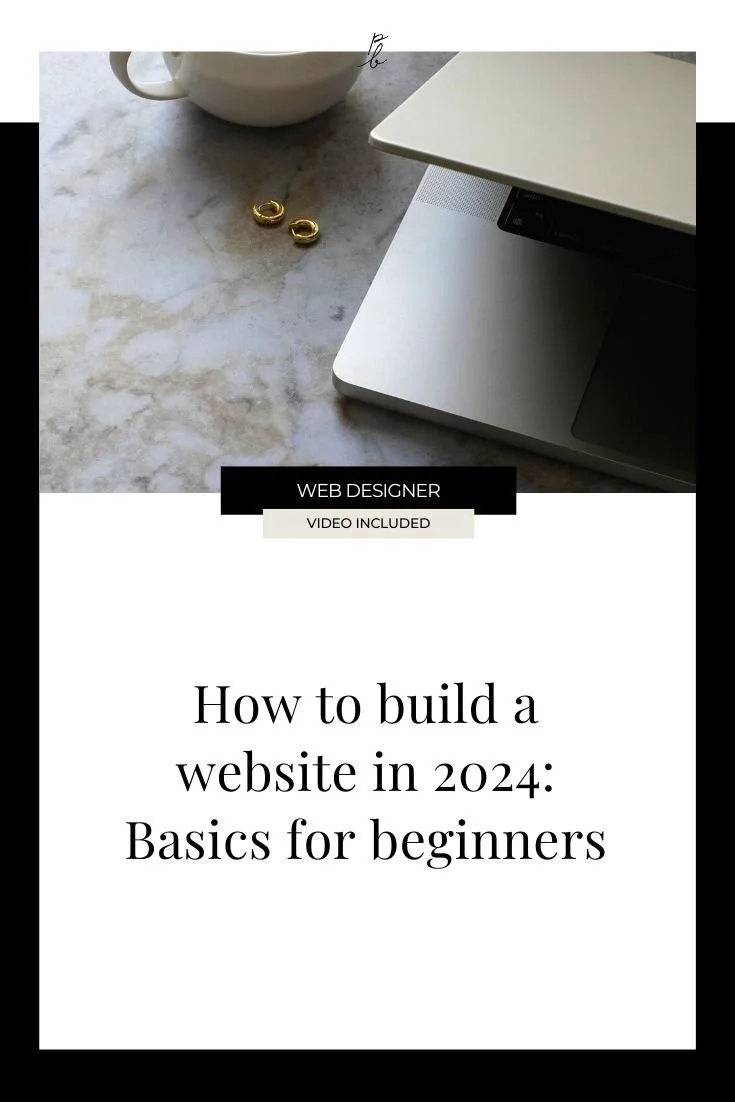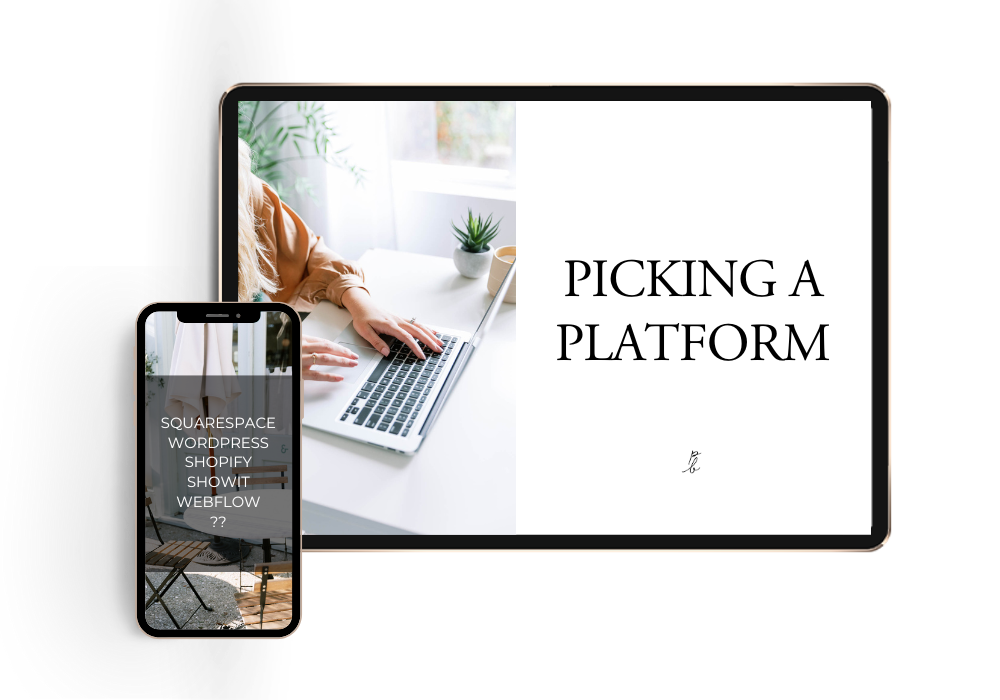How to build a website in 2024: Basics for beginners
Prefer to watch?
Here’s the video!
Mentioned in the Video:
*That’s an affiliate link - my margarita fund thanks you kindly!
Rather read all about it?
The thing which holds so many aspiring small business owners back from having a website is it just feels so overwhelming and so "oh my God, I think I'm allergic to code."
Which in case you missed it, it's 2024, and no one codes to build a website anymore, so feel free to take that fear and put it aside, because it's both not serving you AND not true.
Legitimately, if you are tech-savvy enough to use a computer or a phone and figure out how to click on this shownotes, that's about the level of tech ability you need to build a website these days.
Yes really.
Now I know this can feel intimidating and like there's so many decisions to make, but don't you worry because Auntie Paige is here, and together we're going to get you through this and very soon your business will be on the interwebs, so you can
Look legitimate and
Be found by the people of the internet, including getting found in the search results of Google.
Because as they say, the best place to hide a dead body is on page 2 of Google.
In this episode, we're talking about
Which building platform you should choose, based on your tech ability & what you want your website to do
What the heck a domain is
The cost of all of these things
What you should put on said website
SEO, which is techy website designer speak for Search Engine Optimization and
How to get people to your website.
So, you have some learning to do! I hope you have your beverage of choice at hand, coffee, tea, shot of tequila, full bottle of wine. Whatever is going to get you through this, I don't judge.
Picking a platform
As I said, no one codes a website anymore. Website building platforms are made so even the most technically allergic of us can build a website by dragging and dropping things on a page.
The problem however is there's now SO many website building platforms, it's hard to pick one, and to make it even more confusing there's no one BEST platform, because different ones are best for different website needs. So I'll run through the most popular and tell you when to pick which.
SHOPIFY
If you want to sell hundreds or thousands of physical products and ship them all over the world, and have fancy automations happen then Shopify is what you should use. It's undisputed the best for e-commerce. Every comparison chart and video will tell you that. It's not the easiest platform in the world and the most beginner-friendly, but with a few tutorials, you can definitely put together a functional online shop.
SQUARESPACE
Now let's say you're not selling tea towels and delivering them to all ends of the earth, but instead you intend for your website to be used for other purposes
like advertising your services or
your restaurant or
your yoga studio or
it's a personal site and you just want to write a blog & share your thoughts, or
maybe you want to sell digital products like courses and templates and ebooks,
what should you use then?
The two most popular & best website builders in this case are Squarespace and WordPress!
WORDPRESS
I think the most simple way of explaining the difference between the two is something we're all familiar with. Squarespace is like Apple. It's simple to use, it's all-in-one, it's intuitive and it's beautiful & stylish.
WordPress is like Microsoft or Android phones. There's more options, but also more complications. There isn’t such a focus on style & looks & simplicity, but you have the ability to change everything. But what you get in flexibility, you lose in ease of use.
Seeing that this is a video for beginners, I honestly think you should just stick to the Apple of options, ie. Squarespace.
That's honestly what I find is best for 99% of small businesses and people who are new to making and managing websites. Squarespace can also help you with so much more than just building a site.
Squarespace has so many things built-in which is super handy.
Like email marketing, and
appointment bookings, and
the ability to host courses, and
if you do want to sell physical products through the site too, it also does have e-commerce built-in as well (It's not quite as powerful as Shopify, but if you're just selling a dozen or even a hundred products, it's totally sufficient)
Squarespace has a bunch of templates you can use for free to get you started with your design and the sites just look good so even if you're not the most creative person in the world, you'd actually have to work pretty hard to make the site look bad.
I should probably also mention, this video is not sponsored. Shopify & Squarespace don't pay me to say these great things about them, but I do have affiliate links so you can click those and support the channel and my margharita fund thanks you.
If you want to build an e-commerce store shipping physical products worldwide, choose Shopify. If you want to do anything else, choose Squarespace.
The other thing I need to warn you of to stop you from self-sabotaging is this:
The platform you choose isn't the end-all be-all. The biggest problem will be not getting started.
All of the platforms will get you a website that's online and that's working. All of the platforms give you the ability to be found in the search results. You can do almost everything on most platforms. Yes, some are easier to use than others, and yes some have some extra bells & whistles and features built in or not.
But procrastinating because you're afraid to pick is the worst thing you can do for your business. And everything can be overcome - if some feature you want isn't possible, you can switch website platforms down the line OR probably more likely, you'll just add on some feature with some other software and that's fine too!
2. What is a domain & how to pick one
A domain is your website address — the thing someone types into the browser bar to get to your site. Mine is my name, paigebrunton.com. Apple's domain is apple.com. Starbuck’s domain is starbucks.com.
Domains are often but not always .com's. You could also get .co's or .org's or .ca's is common for Canadians or .co.uk's for the British.
Don't believe the lie however that a .com is superior in terms of your website showing up in Google.
Having a .org or a .co makes no difference to wheather or not you'll come up in the search results. So if the .com for your preferred website name isn't available, you can use another ending and that's totally fine too.
Speaking of where you can check if you're preferred domain is available, you can go to squarespace.com/domain and search for the one you want, but DON'T buy it yet! There's a way you can get it for free, so keep reading to find out how!
3. The Cost
Different website platforms have different prices, there's also multiple options, but for easy comparison and probably what you'll want as a beginner is the smallest most basic plan.
For Shopify that's $29/month when paid annually.
For Squarespace that's $16/month when paid annually.
Now if you're wondering and have heard you need hosting and to pay for that too, just know that's a WordPress thing. With Shopify & Squarespace, you don't need to pay for hosting separately, it's included in your $29/month or $16/month plan. Which is another example of why WordPress isn't the most beginner-friendly. There can be a lot of complications with hosting which is a problem you don't have with Shopify & Squarespace.
Now if you're not sure if you want to commit to the platforms yet, do know they both have a free trial!
Shopify's is 3-days long,
Squarespace is 2-weeks long. Though to be honest, if you ask Squarespace nicely to extend your free trial, I've never seen them say no, so it can be longer than 2 weeks if you need.
In terms of domain .com:
Domains with Shopify are often $15/year and with Squarespace they often used to be $20/year but I'm noticing when I'm looking now they're mostly $12/year, so I guess they recently dropped their pricing there.
Basically, domains are super cheap and there's not a massive variance in price based on where you buy them. You can thankfully easily buy a domain with Shopify & Squarespace, so you don't need to have the complication of buying your website from one place and a domain from another, you can get it all in one spot.
And fun fact, with Squarespace if you pay for your website annually instead of monthly, you actually get your domain for free for the first year!
Okay, so now you've chosen the website platform which is right for you, you've figured out what a domain is and that the ending of it really doesn't matter for you ranking in Google, and you're even fancy enough that you now know paying for hosting is so 2013, let's move on to what to put on your website.
4. What to put on your website
Assuming your building a site for a business you'll likely want the following pages:
A home page
A blog/content page (I'll explain why in a moment when we get to SEO)
Apage where people can learn about working with you or see your service offerings or buy your course or whatever it is you're selling.
Basically a page which makes your business money.
About page is always a nice touch too.
And please put a photo of your face at least once on the website, likely on your about page and maybe your home page too. I can't tell you how much trust is built from seeing your beautiful smiling face on the site.
Now if you want to know what to put exactly on something like your home page to make it look all profesh, I actually have a website home page content planner which guides you through what to think about, what to write, etc.
I used to just share it with my paid course students, but I'll be nice and give you access too.
5. SEO
Moving onto SEO, which again is techy website designer speak for Search Engine Optimization or, more simply, the stuff that you need to do on your website to ensure you get found in Google.
People massively overcomplicate SEO.
They throw out all these wild ideas like "you need meta tags" and "you've got to go into developer mode to make your load speed faster" and they say these things so you feel overwhelmed and then pay them to take that problem off your plate, when really it's not all that difficult.
Here's what matters for SEO. Writing good content. That's it!
That's pretty much SEO simplified. And you might think "but Paige! No, no, no. I've done my research and KEYWORDS are king!" To which I say this.
A few years ago I went to an SEO conference in Berlin. They wanted an example website to roast so I volunteered mine. They asked me "Paige what do you want to be found in in Google?" To which I said "I want to be found for the term Squarespace website designer."
So they Googled the term and low and behold, my website was at the top of the search results. I beat out every single other Squarespace website designer for the top spot.
The SEO speaker then said "okay well, looks like you're doing something right, instead of roasting you let's look at what you're doing right." They went to my home page and read through it and not ONCE was the keyword "Squarespace website designer" on my home page.
Which confused said SEO guy, because keywords do indeed help. He asked me how I did it and I said, “I had just blogged more about Squarespace website design than any other blogger on the internet, but I was always too lazy to put my keywords in the right spots because I found it boring. Instead I enjoyed writing and I had hundreds of blog posts on the topic.”
So moral of the story is: if you write good content, you can basically ignore all the advice about keywords & meta tags and load speed and you're probably going to do just fine.
Or even rank in place #1.
Which brings me back to that blog page we spoke about. If you want more than a snowball’s chance in hell of ranking in Google, you're going to need to write content.
6. How to get people to your website
And that content typically goes on your blog page on your website. Now if you podcast or create YouTube videos like me, don't ignore the SEO aspect.
It's still best practice to write thorough, in-depth show notes for your podcast episodes (not just the lazy 5 bullets of what was spoken about which I see a lot of podcasters do) AND if you YouTube like me, my team writes an accompanying blog post (the one you’re reading right now!!) which basically says what was said in the video so someone could consume the content even if they didn't watch a second of the video.
That's pretty much the bar you need it to pass — if I didn't listen to your podcast episode or watch your YouTube video, could I still get the point of the piece of content?
If you're doing that, you're golden.
Now if you're wondering, okay I put all this work in, this website is looking so darn good, I'm rather proud of myself, maybe I should be a website designer! Maybe you should, it's not actually the most insane idea in the world, that's genuinely how I started.
But then you're wondering, now how do I get people to GO to the site, there's 2 options.
Share it on social media. Which if you have a following of a zillion people already, fabulous! If that's not however the case and you kinda want the website to get seen beyond the 200 Instagram followers you have…
That's when SEO becomes important again. So often people think "okay so I write these blog posts and then for people to see them I need to share them somewhere." And... that's kinda not the point. The point is you write good content, and then Google puts it in the search results and then people find your site through the search results.
So if you're writing good content, you don't really need to worry about sharing the blogs elsewhere, just writing good content is enough.
Now of course, what is GOOD content and how do you create it? Watch the SEO video below, or if you want a tutorial on how to build your site on Squarespace, click the one after that!
You’ll Also Love...
4 ways to get a Squarespace discount offer code/coupon code in 2024
Is it too late to become a Squarespace web designer in 2024?
How much can I charge as a Squarespace Website Designer in 2024?
Ultimate Squarespace SEO Checklist - My Interview with Squarespace SEO Expert Henry Purchase
How to start building a website in Squarespace version 7.1 -Updated for 2023







